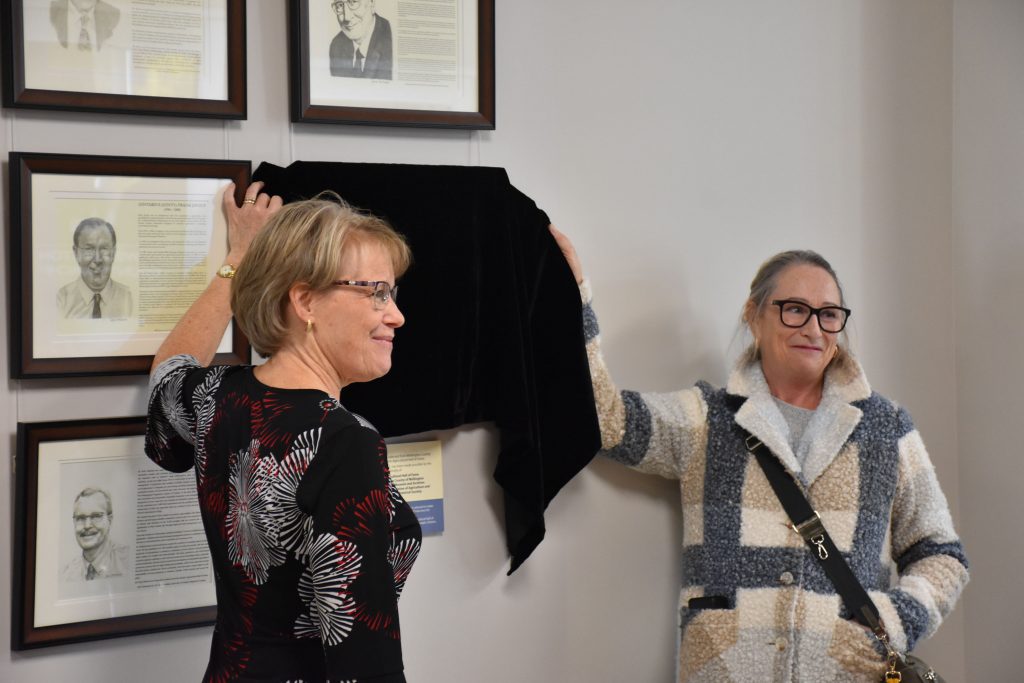ABOYNE – A portrait of Dr. Richard Frank, who was recently inducted into the Ontario Agricultural Hall of Fame, was unveiled at the Wellington County Museum and Archives on Oct. 22.
Richard, who died in 2021, graduated in the University of Guelph’s first PhD class.
He was involved in early research on the safe use of herbicides at the beginning of his career at the University of Guelph Ridgetown campus, then called Ridgetown College.
“We’re all so proud of him and all his accomplishments,” said Sandra Frank, Richard’s daughter-in-law.
“He was super kind-hearted and was a gentle man and always had a smile on his face,” said Richard’s granddaughter Victoria Frank.
Frank’s many roles
Richard became head of a newly established pesticide lab in 1966, where he tested and monitored Ontario food and environmental samples for contamination residues.
“I read through the list of [Richard Frank’s] accomplishments and I had no idea that guy had so many feet in so many pies,” said Ian Easterbrook, a director of the Wellington County Historical Society.
From 1982 to 1990, Richard was director of the Agricultural Lab Services Board and was one of the first to recognize the dangers of DDT (dichlorodiphenyltrichloroethane) and other organo-chlorine pesticides to the environment.

RICHARD FRANK
According to the Ontario Agricultural Hall of Fame website, his research, which examined the link between pesticide usage in fields to pesticide concentrations detected in outflow samples from all major river basins, served as a global model and it was adopted all over the world.
“He’s been beavering away trying to draw attention to both the downside and the upside, but probably more the downside, of using herbicides and pesticides,” said Easterbrook.
At one point in time, Richard was also an ornithologist and took part in bird banding, according to Victoria.
“He was just a very adaptable scientist and dove into a lot of different areas of environmental, birds, dinosaurs… everything,” she said.
“He always had a love of nature,” said Robert Frank, Richard’s son.
“I think learning about the effects of pesticides on the environment just deepened his love of nature.”
Induction process
Richard was nominated for the Ontario Agricultural Hall of Fame by his family.
Nomination packages are available at oahf.on.ca/induction-process and are due by Oct. 31 each year.
The board of directors reviews all nomination packages after being submitted and selects inductees based on the information provided.
Successful candidates are inducted into the Hall of Fame (located now at its new location in Guelph) at the annual induction ceremony held the second Sunday of June.
The Wellington County Museum and Archives has a wall dedicated to Wellington County-area residents who have been inducted in the Ontario Agricultural Hall of Fame.
It is located in Aboyne Hall, and this is where last week’s unveiling was held.

Janice MacDonald, left, and Richard Frank’s daughter Elizabeth unveil the scientist’s portrait at the Wellington County Museum and Archives. Photo by Nicole Beswitherick
The unveiling
At the event, Richard’s portrait was unveiled by the artist Janice MacDonald and Richard’s daughter Elizabeth.
Many of Richard’s family members were at the museum to see him join the wall of 21 other Hall of Fame inductees from Wellington County.
To read more about Richard Frank, visit oahf.on.ca.




